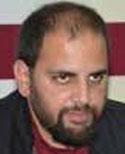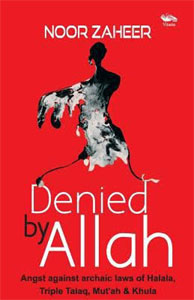
By Mushtaq Ul Haq Ahmad Sikander, New Age Islam
11 May 2020

Denied by Allah: Angst against archaic laws of Halala, Triple Talaq, Mut’ah &Khula
Author: Noor Zaheer
Publisher: Vitasta Publishing Pvt Ltd, New Delhi, India
Pages: 152, Price: Rs 250
ISBN: 9789382711582
Women have been the marginalized other. Despite the progress and enlightenment, the patriarchy is so much integrated in institutions and social structures that women still find themselves bound to invisible chains. Islam and its Holy scripture Quran, was revealed to change this scheme of things. Instead its message of liberation, empowerment and freedom was bogged down by the patriarchal interpretation of its message. This patriarchal interpretation has been a norm for most Ulama. They have justified it in the name of Islam, and now over these centuries it has attained a status of sanctity and sacredness. Even most of the Ulama are unaware of the real spirit of Islam and message of Quran, so they become a source of reinforcing the patriarchy. This patriarchal interpretation over the course of time became mainstream narrative.
The book under review by eminent writer-activist and researcher, Noor Zaheer is a collection of her articles on different aspects of women issues related to Islam. Noor appears to be writing from a vantage point about Islam, so many times her judgment seems flawed and conclusions wrong. In the author’s note, Noor observes that “Quran has relegated women to a secondary position, right from where it describes the formation of the universe and the creation of Adam and Eve. It accuses Eve as the cause of the original sin and the reason for Adam being thrown out of paradise; and to date women are being punished for this crime.” This is something that Quran does not accuse Eve of. Quran expounds that both Adam and Eve were responsible for the sin. (Surah 2: 36). Continuing in the same vein, she articulates, “However, Shariah was optional and not completely binding on a Muslim till the Wahabi version of Islam surfaced.” This claim is also not supported by Muslim history as Shariah in its different versions was implemented by Caliphs and Muslim kings. Noor tries to discount this important fact while rendering Shariah as optional and just associated with Wahabi Islam that is a very recent phenomenon among Muslims.
Noor explains the purpose of her book as, “An attempt to show the contradictions within Quran, the way they have been highlighted and interpreted to give an edge to patriarchy, the manner in which tribal customs have been made out to be the actual Islam and the woman has been relegated to the position of being a non-entity.” But while going through the book, Noor fails in her attempt, as she is not able to distinguish between the text and interpretation. So, this wrong methodology makes her arrive at skewed conclusions.
The case studies Noor offers in the various chapters of the book are factual and various progressive ulama and theologians are trying to rectify the issues that she highlights. Halala as a practice has been abused and women have been its worst victims. Its misuse and the grave implications, it has on women is discussed succinctly. The Halala industry has rendered the abuse into a complete business, so is the case with Mut’ah marriages that are prevalent among Shia Muslims. The origins of these malpractices and misogyny are the practice and abuse of right of Talaq by Muslim men. It is because of their abuse of power and right, that women have been rendered vulnerable. Also, men have been able to escape with the sin of Adultery by pronouncing Talaq. To add insult to injury they have been able to manage and declare woman as the culprit and liable for punishment if they object to their adulterous way of life. The abuse of Triple Talaq is a known reality but Fake Talaqnamas are a new addition to this crime.
Wahabi interpretation of Islam is criticized and their misuse of religion condemned. Time and again the discussion involve patriarchy and how over these centuries it has survived. One of the reasons that gets overlooked in the process is that role of women in sustaining patriarchal structures is overlooked. For many fighting patriarchy is synonymous to male bashing, thus reducing this important struggle to male-female dichotomy. The factual reality however is to overcome this pitfall and trap. Noor seems to understand this very purpose as she says that Shariah courts headed by women certainly will not help mitigate the crisis that women are baffled with. It has been witnessed through experience and history testifies that men and women both have been perpetuators and victims of patriarchy. Some among them also have been on the fore front in a struggle for gender justice. We need to have more gender just men and women in positions of power and a reform movement initiated by them will help in attaining this important goal of gender justice.
Issues such as Iddat, socio-economic problems of women, lack of educational opportunities and property rights form the variegated themes and topics that are discussed in the book. These are justified concerns that Noor articulates so vehemently. But continuing with her Islam bashing, Noor says, “One is not contesting that women, in the pre-Islamic era, might have been badly treated; but Islam did not in any way better their position. Rather, it set down a complete doctrine that would have to be adhered to and that did not allow the possibility of any change in the position of the woman.” (P-78) It is an unfounded claim about Islam. The history has a verdict against it. Islam did empower women and Quranic discourse about women still is based on rights. It empowered them with a wide range of rights; educational, economic, social, political and communal. However, it is a factual reality that patriarchal interpretation of Islam, sabotaged its message and dictates of empowerment. The rights that Quran bestowed on women were snatched by the interpretation of men.
Overall, the book is to be read with a pinch of salt and due caution. The arguments would have been articulated in a better manner, without stooping low to attack Islam and Quran. Noor misses out the distinction between Islam and its interpretation. Her writings propose something similar to the mainstream narrative where common masses take the interpretation of Ulama as sacred and revealed one. Noor like most people seems to be a victim of that trap. In her struggle to overcome the trap, she uses wrong methodology and analogy. So instead of freedom she is mired further in the jargon of traps.
An occasional columnist for NewAgeIslam.com, M.H.A.Sikander is Writer-Activist based in Srinagar, Kashmir
URL:

No comments:
Post a Comment